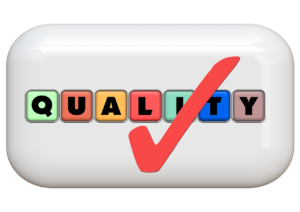In today’s fiercely competitive business landscape, understanding the question “what is To improve quality” holds the key to unlocking success and longevity for small businesses. Quality is not just a buzzword, it is the cornerstone of customer satisfaction, brand reputation, and sustainable growth.
Picture this: delighted customers spreading the word about your exceptional products or services, giving you an edge over rivals and bolstering your bottom line. But achieving such excellence demands more than just good intentions—it requires strategic investment and commitment.
Improving the quality of your goods or services in your small business can bring several significant benefits, despite the initial costs and effort involved.
While some may balk at the notion of hiring a process improvement specialist or implementing costly changes, the truth is that the benefits far outweigh the initial outlay.
From reduced costs and increased market share to enhanced reputation and regulatory compliance, the rewards of prioritizing quality are manifold. This article looks at the transformative power of quality improvement, uncovering how it can propel your small business to new heights of success.
What is to Improve Quality? – Customer Satisfaction

Customer satisfaction lies at the heart of any successful business endeavor. When you prioritize quality improvement, you’re essentially prioritizing the happiness and loyalty of your customers.
By consistently delivering higher quality products or services that meet or exceed their expectations, you cultivate trust and loyalty, turning one-time buyers into lifelong advocates for your brand.
Satisfied customers are not only more likely to make repeat purchases themselves, but they also become powerful ambassadors, spreading positive word-of-mouth and attracting new business through referrals.
Moreover, in today’s interconnected world where online reviews and social media play a key role in shaping consumer perception, satisfied customers can become your most effective marketing assets, amplifying your brand’s reach and influence far beyond your immediate sphere of influence.
In essence, investing in quality improvement means investing in the long-term satisfaction and success of your customers, which in turn drives sustainable growth and profitability for your small business.
What is to Improve Quality? – Competitive Advantage
Competitive advantage is the holy grail of business success, and quality improvement serves as a potent tool in achieving it. In a crowded marketplace where consumers are bombarded with choices, offering superior quality products or services sets you apart from competitors.

By consistently meeting or exceeding customer expectations, you carve out a distinct niche for your business, attracting discerning consumers who prioritize quality over price alone.
This differentiation not only helps you command premium pricing but also fosters brand loyalty, as customers develop a preference for your offerings over those of your rivals.
Furthermore, a reputation for quality can act as a roadblock for new competitors, as establishing the same level of trust and credibility takes time and effort.
Ultimately, a commitment to quality improvement is not just about keeping up, but about staying ahead, securing your position as a leader in your industry and ensuring long-term success for your small business.
What is to Improve Quality? Reduced Costs
While there may be upfront costs associated with improving quality, in the long run, it can actually reduce costs. Higher quality often means fewer defects, rework, and returns, which can lower production costs and improve efficiency.
Plumbing
Reducing costs through quality improvement initiatives is a critical aspect of small business sustainability and profitability across various industries.
In plumbing, for instance, ensuring the use of high-quality materials and employing skilled technicians can significantly reduce the likelihood of leaks, pipe corrosion, or other issues that might require costly repairs down the line.

By investing in durable pipes and fixtures upfront, a plumbing business can minimize callbacks and warranty claims, ultimately saving money on labor and materials.
What is to Improve Quality in Construction Renovations?
In construction renovations, quality improvement measures such as thorough planning, precise execution, and attention to detail can lead to fewer mistakes, rework, and delays.
By adhering to stringent quality standards and utilizing skilled labor, a construction firm can avoid costly errors like incorrect measurements or subpar craftsmanship, which might necessitate costly fixes and project delays.
In addition, using energy-efficient materials and practices can lead to long-term cost savings for both the business and its clients through reduced utility bills and maintenance expenses.
Manufacturing
In manufacturing, implementing quality control processes and continuous improvement methodologies can help identify and rectify production inefficiencies, defects, and waste.
For example, a manufacturing company (even a small one) might invest in automated quality inspection systems to detect and address defects early in the production process, reducing scrap, rework, and warranty claims.

By streamlining operations and optimizing workflows, the business can enhance productivity, minimize downtime, and lower overall production costs.
Family Owned Business
Even in a small family-owned business whether in construction or, like a neighborhood bakery, improving quality can have a significant impact on cost reduction.
By sourcing fresh, high-quality ingredients and adhering to strict quality standards in baking processes, the bakery can minimize waste, ensure product consistency, and reduce the likelihood of customer complaints or returns.
This not only saves money on ingredient costs but also enhances customer satisfaction and loyalty, ultimately driving repeat business and revenue growth.
Enhanced Reputation
Consistently delivering high-quality goods or services builds a positive reputation for your business. A good reputation can help you attract new customers and partners, and it can also protect your business against negative publicity or crises.
Consistently delivering high-quality goods or services through quality improvement builds a positive reputation for your business and establishes it as a trusted and reputable entity in the eyes of not only customers, suppliers, and stakeholders.
Such deliveries foster positive word-of-mouth referrals, strengthens brand loyalty, and attracts new customers. A strong reputation opens doors to new opportunities, partnerships, and collaborations, while also shielding your business from the impact of negative publicity or crises.
Ultimately, a stellar reputation is invaluable currency in today’s competitive marketplace, serving as a powerful asset that propels your small business towards sustained success and growth.
What is to Improve Quality? – Increased Market Share
By consistently delivering quality, your business can capture a larger share of the market. Customers are willing to pay a premium for quality products or services, allowing you to expand your customer base and grow your business.

Increased market share is a direct result of quality improvement initiatives that position your business as a preferred choice among consumers. Positive word-of-mouth referrals and glowing reviews attract new customers, while repeat business from satisfied clients solidifies your foothold in the market.
In addition, as your reputation for quality grows, you become the go-to option for consumers seeking reliability and excellence, further expanding your customer base. With a larger market share, your business gains greater influence, bargaining power, and economies of scale, all of which contribute to enhanced profitability and long-term success.
By prioritizing quality improvement, you not only differentiate your business but also carve out a larger slice of the market pie, securing your position as a leader in your industry.
What is to Improve Quality? – Regulatory Compliance
Depending on your industry, there may be regulatory requirements or standards related to product or service quality. Meeting or exceeding these standards not only ensures legal compliance but also demonstrates your commitment to quality and professionalism.
Regulatory compliance is top priority in industries such as plumbing, construction renovations, manufacturing, and small family-owned businesses, where adherence to industry standards and government regulations is essential.
For instance, in plumbing, failure to comply with building codes and safety regulations can result in fines, legal repercussions, and damage to reputation. Similarly, in construction renovations, non-compliance with zoning laws or environmental regulations can lead to costly delays, project shutdowns, and legal liabilities.

In manufacturing, overlooking regulations related to worker safety, product labeling, or environmental protection can result in hefty fines, product recalls, and damage to brand reputation. Even in small family-owned businesses like bakeries, non-compliance with food safety regulations can lead to health violations, customer illness, and business closure.
The consequences of non-compliance extend beyond financial penalties; they can irreparably damage a business’s reputation and credibility. Customers may lose trust in the brand, leading to a decline in sales and market share.
Therefore, investing in quality improvement measures that ensure regulatory compliance is not only a legal requirement but also a vital component of safeguarding the long-term success and viability of a business.
Conclusion – What is to Improve Quality
While it is true that hiring a process improvement specialist may involve additional costs, their expertise can help streamline your operations, identify areas for improvement, and implement effective quality management systems.
In the long run, the benefits of improved quality often outweigh the initial investment, leading to better business outcomes and sustainable growth. In addition, there are various resources and tools available that can help small businesses improve quality without necessarily needing to hire external consultants.
Related Articles
- Small Business Cost Saving Ideas – How to Improve Profit
- How Process Improvements Help the Trades – Increase Profit
- How to Manage Customer Expectations – Seek Clarity
- Quality Management System for Small Business – Create One

